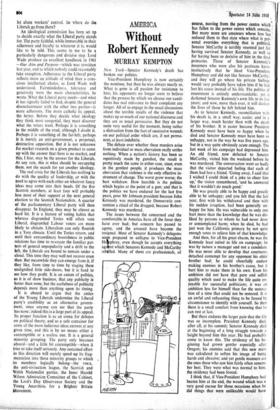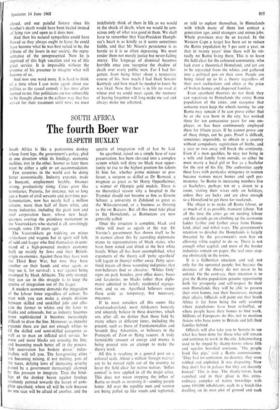Without Robert Kennedy
AMERICA MURRAY KEMPTON
New York—Senator Kennedy's death has broken our politics.
Vice-President Humphrey is now certainly the nominee, but then he was always nearly so. What is gone is all passion for resistance to him; his opponents no longer seem to believe that the process by which we choose our candi- dates has real relevance to their complaint any longer. All of us engage in the usual discussions about the terrible results of the violence that makes up so much of our national discourse and they are as usual persuasive. But they do not seem very useful for the moment, being rather a distraction from the fact of successive wounds on our political order which are, if not perma- nent, at least indefinite.
The debate over whether these murders arise from individual or mass aberration really settles nothing. When a nation's history has been so repetitively made by gunshot, the result is pretty much the same in either case, since, even in the gentlest people, it produces the mass aberration that violence is the only effective in- strument of change. The worst grow worse; the best withdraw. How horrible is the politics which begins at the point of a gun; and that is the politics we have endured for the last five years, poor Mr Johnson president because John Kennedy was murdered, the Democratic con- vention a ritual of the drugged, because Robert Kennedy was murdered.
The issues between the concerned an(' the comfortable in America have all the force they have ever had; but concern has passed to agony, and the aroused have become the resigned. Most of Senator Kennedy's delegates seem prepared to collapse to Vice-President rey, even though he accepts everything ag st which Senators Kennedy and McCarthy rebelled. Many of them are professionals, of course, moving from the power centre whiee, has fallen to the power centre which remains. But many more are amateurs whose loss has reduced them to that state where what is per.
sonal overrides everything that is political. Senator McCarthy is terribly resented just for having survived Senator. Kennedy, as well as for having been so derisive of him in the final primaries. Those of Senator Kennedy's mourners who were also his partisans know instinctively that he liked Vice-President Humphrey and did not like Senator McCarthy; and they will go where his private feelings would very probably have taken him if he had lost his cause instead of his life. The politics of resentment is entirely understandable; yet it darkened Senator Kennedy's own life in its last years; and now, more than ever, it will darken the lives of those he left behind him.
As to Senator Kennedy, reconciliation with his death is, in a small way, easier, and in a larger way, much harder than with the death of his brother. It is easier because President Kennedy must have been so happy when he died and Senator Kennedy must have been so unhappy, not in the way he was five years ago, but in a way quite obviously acute enough. The last week of his campaign had depressed him. An old friend, now defected to Senator McCarthy, visited him the weekend before he was murdered. The conversation went so badly that the visitor departed feeling that each of them had lost a friend. 'Going away, I said that I wished I could think of a joke to cheer him up,' the visitor remembered, 'and he answered that it wouldn't do much good.'
He was greatly able to be happy and greatly able to be unhappy; and you felt that the last year, first with his withdrawal and then with his sudden irruption, had been generally un- happy for him. He was vulnerable to only one hurt more than the knowledge that he was dis- liked by persons to whom he had never done or contemplated harm; when he died, he had just won the California primary by not quite enough votes to relieve him of that knowledge. And then, for all his great charm, he was the Kennedy least suited to life on campaign; he was by nature a manager and not a candidate. He was never able to develop that courteous, detached contempt for any opponent his older brother had; he could cheerfully endure making enemies in his brother's cause, but it hurt him to make them in his own. Even his ambition did not have that pure and selfish quality which used to make the life quite en- joyable for successful politicians; it was an ambition less for himself than for the restora- tion of a time that could not be restored. It is an awful and exhausting thing to be forced by circumstance to identify with yourself. So then there is a small comfort from knowing that he can rest at last.
But there endures the larger pain that the life was so incomplete. President Kennedy died, after all, at his summit; Senator Kennedy died at the beginning of a long struggle towards a height beyond him this year. He had probably come to know this. The stridency of his be- ginning had grown gentler especially after Oregon; his enemies said that this new mien was calculated to soften his image of being harsh and abrasive; and yet gentle manners are the ones those who saw him fairly often remem- ber best. They were what was normal to him; the stridency had been forced.
I think that, if Vice-President Humphrey had beaten him at the end, the wound which was a very good excuse for those occasions when he did things that were unlikeable would have
closed, and our painful history since his brother's death would have been healed instead of lying raw and open as it does now.
And then his natural sympathies could have flowed as they always ought to have; he could have become what he was best suited to be, the tribune of the losers in our society, the repre- sentative of the unrepresented. Now he is deprived of this high vocation and we of this great service. It is impossible without the promise of his presence to imagine what will become of us.
And now one word more. It is hard to think of a time when I can write again about our politics as the casual comedy it has most often seemed to me. Our politicians are too vulnerable to be thought about in the callous way that has served for their treatment until now; we must
indefinitely think of them in life as we would in the shock of death, when we would be con- scious only of what was good in them. We shall have to remember that Vice-President Humph- rey's heart is as kindly as it seems sometimes feeble, and that Mr Nixon's persistence is as heroic as it is so often depressing. We must render them not merely justice but never-failing mercy. The language of dismissal becomes horrible once you recognise the shadow of death over every public man. For I had for- gotten, from being bitter about a temporary course of his. how much I had liked Senator Kennedy and how much he needed to know he was liked. Now that there is in life no road at whose end we could meet again, the memory of having forgotten will long make me sad and always make me ashamed.











































 Previous page
Previous page